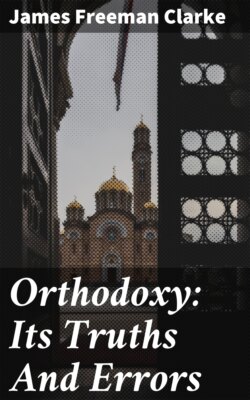Читать книгу Orthodoxy: Its Truths And Errors - James Freeman Clarke - Страница 38
На сайте Литреса книга снята с продажи.
§ 9. Final Result of this Examination.
ОглавлениеTable of Contents
We have thus examined, as thoroughly as our limited space will allow, the questions at issue, on the subject of miracles, between the old Orthodox and recent heterodox views; and the result to which we have arrived may be thus stated:—
1. We may believe, on the testimony of history, that through Jesus of Nazareth there entered the world a great impulse of creative moral life, which has been, and is now, renewing society. This new impulse of life may be regarded as miraculous or supernatural.
2. We may believe, though perhaps less strongly, but still decidedly, that during the stay of Jesus on earth many extraordinary phenomena took place, such as the sudden healing of the sick, the raising of the dead to life, a display of miraculous insight and foresight, or knowledge of the present and the future, and some influence over organic and material life, and over the lifeless forces of nature. The precise limits of this we do not know, and need not pretend to define. We need not think it essential to fix the boundary. It may be interesting as speculation, but it is not important as religion.
3. For, in the third place, we may say that these miracles of Jesus have very little direct bearing on our religion. As they illustrate his character, they are valuable, and also as they help us to believe that the laws of nature are not stiff and rigid, like the movement of a machine, but that there is force above force, a vortex of living powers, in the universe, rising higher and higher towards the fountain of all force and life in God. All portents and wonders are useful, as they shake us out of the mechanical view of things, and show that even the outward, sensible world is full of spiritual power.
4. We may also believe the miracles of Jesus to be [pg 086] natural in this sense—that under the same conditions they could have been done by others, and that they are probably prophetic of a time in which they shall be done by others. Looked at as mere signs or portents, he himself discouraged any attention being paid to them. Looked at as logical proofs to convince an unbeliever, he never brought them forward. His object in miracles, as stated by Mr. Furness, was simply to express his character. Some, indeed, were symbolical, as the cursing of the fig tree. It is the custom in the East for teachers to speak in symbolic language.
Miracles were at first believed, on low grounds, as violations of law by a God outside of the world. Now they are disbelieved on scientific grounds. They may possibly be believed again on grounds of philosophy and historic evidence, not as portents, not as violations of law, not as the basis of a logical argument, but as the natural effluence and outcome of a soul like that of Jesus, into which a supernatural influx of light and life had descended. They are not more wonderful than nature; they are not so wonderful as the change of heart by which a bad man becomes a good man. But they will find their proper place as evidence how plastic the lower laws are to the influence of a higher life.
[pg 087]
